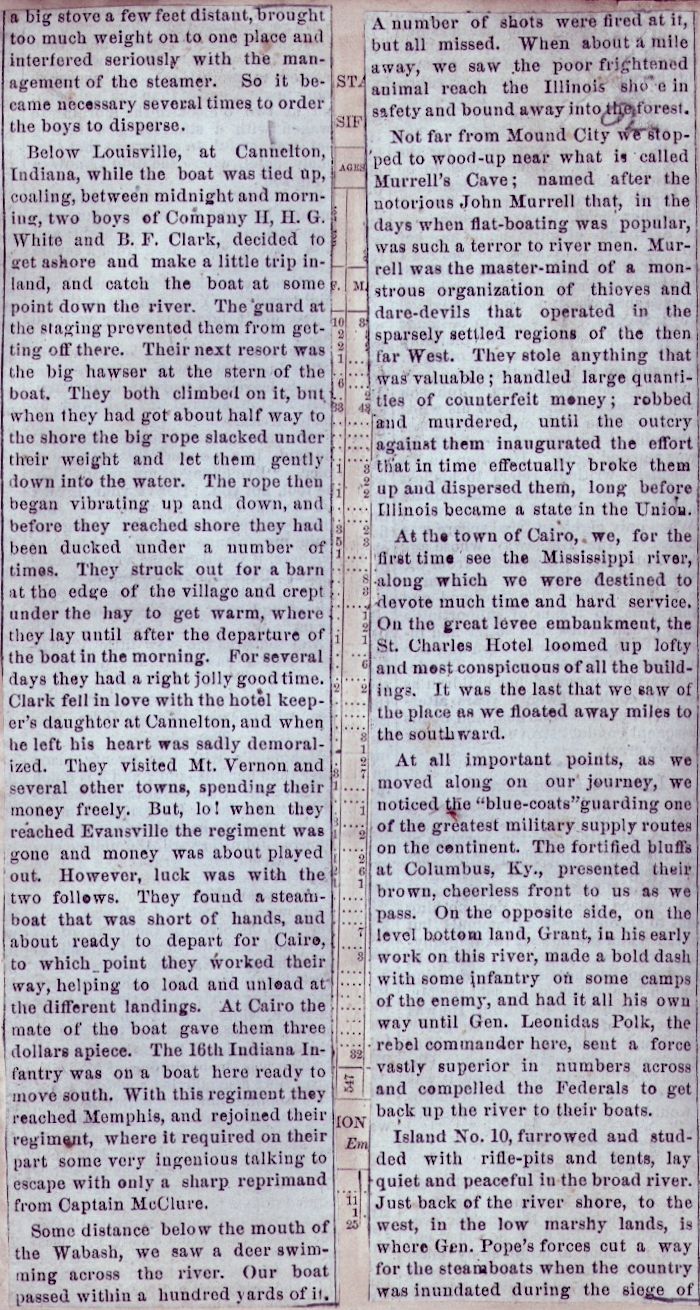| Camp & Field Page 47 | Camp & Field Index Page | 16th OVI Home Page | Camp & Field Page 49 |
The Camp & FieldArticles by Theodore Wolbach |
 Cpl. Theodore D. Wolbach |
The following image is taken from a book titled "Mortality and Statistics of the Census of 1850" in which it is believed retired Captain Rezin H. Vorhes, Company H, pasted over the pages a series of articles written by Cpl. Theodore D. Wolbach, Company E, titled "Camp and Field" and published, by chapter, in the Holmes County (Ohio) Republican newspaper from February 24, 1881 to August 17, 1882. The articles tell the story, in great detail and color, of the 16th OVI, from the inception of the 3-year regiment in October, 1861, through all its camps, battles and marches until it was disbanded on October 31, 1864. The articles pasted in the Vorhes book cover the first 35 chapters, published through October 20, 1881. All the remaining chapters were recently found in a Holmes County library by researcher Rob Garber who obtained copies, performed the transcriptions and provided to this website and which are also presented here, thus providing the complete work by Theodore Wolbach.
Throughout these articles click on the underlined white text for additional details.
The webauthor thanks 16th Ohio descendant Rob Garber for his excellent research on the Camp And Field articles and for performing the tedious digital transcription of those articles found on each page. The transcriptions were made to reflect the original articles verbatim, misspellings and all. Rob is the 3rd great nephew of Capt. William Buchanan, Company F, 16th Ohio, who served in the 90-day regiment as a private, re-enlisting in the three year regiment, and eventually making the rank of Captain of Company F. Thanks Rob!
Page 48 - Chapter 30 - November, 1862
 |
a big stove a few feet distant, brought too much weight on to one place and interfered seriously with the management of the steamer. So it became necessary several times to order the boys to disperse. Below Louisville, at Cannelton, Indiana, while the boat was tied up, coaling, between midnight and morning, two boys of Company H, H.G. White and B.F. Clark, decided to get ashore and make a little trip inland, and catch the boat at some point down the river. The guard at the staging prevented them from getting off there. Their next resort was the big hawser at the stern of the boat. They both climbed on it, but when they had got about half way to the shore the big rope slacked under their weight and let them gently down into the water. The rope then began vibrating up and down, and before they reached shore they had been ducked under a number of times. They struck out for a barn at the edge of the village and crept under the hay to get warm, where they lay until after the departure of the boat in the morning. For several days they had a right jolly good time. Clark fell in love with the hotel keeper's daughter at Cannelton, and when he left his heart was sadly demoralized. They visited Mt. Vernon and several other towns, spending their money freely. But, lo! When they reached Evansville the regiment was gone and money was about played out. However, luck was with the two fellows. They found a steamboat that was short of hands, and about ready to depart for Cairo, to which point they worked their way, helping to load and unload at the different landings. At Cairo the mate of the boat gave them three dollars apiece. The 16th Indiana Infantry was on a boat here ready to move south. With this regiment they reached Memphis, and rejoined their regiment, where it required on their part some very ingenious talking to escape with only a sharp reprimand from Captain McClure. Some distance below the mouth of the Wabash, we saw a deer swimming across the river. Our boat passed within a hundred yards of it. |
A number of shots were fired at it, but all missed. When about a mile away, we saw the poor frightened animal reach the Illinois shore in safety and bound away into the forest. Not far from Mound City we stopped to wood-up near what is called Murrell's Cave; named after the notorious John Murrell that, in the days when flat-boating was popular, was such a terror to river men. Murrell was the master-mind of a monstrous organization of thieves and dare-devils that operated in the sparsely settled regions of the then far West. They stole anything that was valuable; handled large quantities of counterfeit money; robbed and murdered, until the outcry against them inaugurated the effort that in time effectually broke them up and dispersed them, long before Illinois became a state in the Union. At the town of Cairo, we, for the first time see the Mississippi river, along which we were destined to devote much time and hard service. On the great levee embankment, the St. Charles Hotel loomed up lofty and most conspicuous of all the buildings. It was the last that we saw of the place as we floated away miles to the southward. At all important points, as we moved along on our journey, we noticed the Island No. 10, furrowed and studded with rifle-pits and tents, lay quiet and peaceful in the broad river. Just back of the river shore, to the west, in the low marshy lands, is where Gen. Pope's forces cut a way for the steamboats when the country was inundated during the siege of |
| Camp & Field Page 47 | Camp & Field Index Page | 16th OVI Home Page | Camp & Field Page 49 |